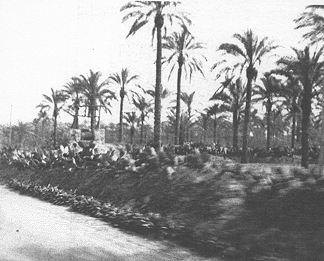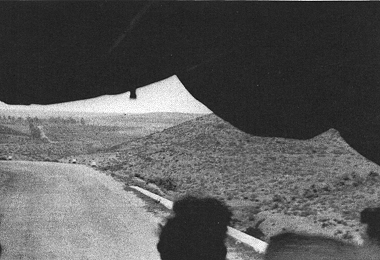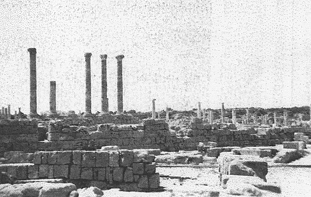R.A.P.C. – MAIDA CAMP, FAYID – 1954-55
As Remembered By Graham Horlington
Most of our intake comprising 6,7 & 8 Platoons at Waller Barracks, Devises. Wilts, were classed A1 for overseas. Following embarkation leave, we reported to a transit camp near Aldershot. Those destined for Egypt were issued with sand coloured K.D., whilst a few going to West Africa and Malaya were issued "Jungle Green".
From Aldershot we went to the London Assembly Centre known as "The Black Hole" – a series of disused London Underground tunnels. 130ft below ground, reached by stairs. We lugged our kit down to what was an underground military camp, comprising Guard Room, Admin, Cookhouse and tunnels lined with 3 tier bunk beds for 1000’s of troops. All day a tannoy kept up a steady stream of calls of flight numbers, when those troops had to return to the surface etc. At 6 pm all flights from RAF Manston ceased for the night and we were allowed out to partake of London night life.
Our flight to Fayid was called after about 36 hours waiting. On arrival at Maida Camp, Fayid, we were addressed by the O.C., Colonel Haggard, warning us of the dangers of militant natives who were liable to fire at us and as a reminder we were issued with an instruction leaflet on "How to React".
|
READ THIS CAREFULLY. YOUR LIFE MAY DEPEND
Finally, do be sensible, and do not do anything stupid.
Colonel G. HAGGARD
|
I was a member on several armed vehicle convoys from Fayid to Port Said. On one occasion a truck broke down at night. A Recovery Truck racing to help skidded into the Sweet Water Canal. Panic!!! - convoy at a standstill at night near a village.
O.C. convoy happened to be our R.S.M. A fearsome man with a string of medal ribbons earned during WWII. (An earlier encounter with him when I was "THAT MAN!!!" spotted ‘strolling’ across his beloved Parade Ground!)
He immediately formed us into a defensive perimeter, whilst telling us to "keep calm, look to your front and fire when ordered."
Eventually we re-mounted, without firing a shot and the convoy continued back to Fayid.
Later we got to know that when the Scammell Recovery Truck was eventually pulled from the Sweet Water Canal it had been stripped of everything not welded down.
MY NEXT DEPLOYMENT AFTER THE CANAL ZONE
Following the Agreement between Britain and Egypt (Oct 1954), preparations began for the evacuation of the Canal Zone by British troops.
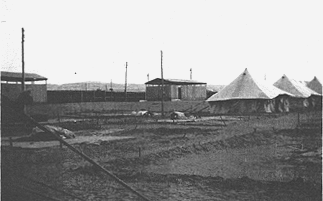
Gradual evacuation of Maida Camp, Fayid
At the Middle East Command Pay Office, Maida Camp, Fayid (comprising some 12,000 troops) as part of the process, some members of the R.A.P.C. were deployed to Cyprus. At the same time within the General Accounts Section at Maida Camp a large number of soldiers records were transferred to a separate Nissan hut now called the ‘Tripoli Section’.
Several months later some 10-12 if us R.A.P.C. privates and N.C.O.’s were detailed to proceed to Tripoli to form the basis of a new ‘Tripolitania District Pay Office’. The soldiers’ record files were crated up and, in a convoy of trucks along with ourselves, full kit and weapons, set of to Port Said.
On arrival we embarked on L.S.T. Snowdon Smith along with men from other units. The ship was already fully loaded with trucks, tanks etc but was never designed as a troop ship! Consequently we were obliged to sleep under lorries, on stretchers or anywhere else that was convenient.
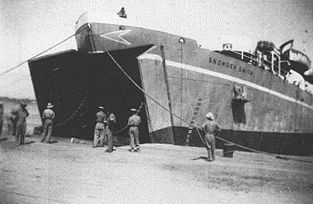
Preparing to board the L.S.T. Snowdon Smith
The galley was also hardly equipped to cater for a large number of men. At mealtimes we were squeezed between the guard rail against our back and a small serving hatch crawling with cockroaches, from where our food was slapped into our mess tins held in one hand, whilst we held onto the guard rail with the other hand to prevent falling overboard!.
As we know, the Army cannot abide idle soldiers so some of us were employed during the voyage painting the wheel nuts on the trucks. In addition the senior W.O. on board decided we would have to have a Parade! There was very little open space to hold a Parade, so we were formed up in short lines about seven deep! With the ship rolling we were ‘obliged’ to first run ‘en bloc’ towards this W.O., whilst he screamed ‘Stand Still In The Ranks’. As the ship rolled the other way you can imagine what happened! That was the end of the ship’s Parades, but gave us all a good laugh.
After about a weeks voyage, including a stop at Benghazi, we sailed into Tripoli harbour. It was rumoured that it was anticipated Britain would re-occupy the Canal Zone at some stage. Troops stationed in Libya would strike across the desert to achieve this. However, in the event in 1956, the then King Idris of Libya would not allow British troops stationed there to use his country as a means of invading another Arab country.
Countryside inland from Tripoli, Libya |
View from the back of a lorry |
Our camp was about 20 km into the desert from Tripoli. We now occupied WW2 Italian tank sheds – an improvement on the rotting 4 man tents of the Canal Zone. Prinn Barracks also housed Royal Engineers and a R.E.M.E. tank repair facility. Funny, it was only the R.A.P.C. who mounted guards!
For recreation any Army bus would take us into Tripoli, where we could swim in the sea, have a meal and go to the A.K.C. on a Saturday. Trips were also organised to visit the ancient Roman city of Sabratha and the mountainous countryside.
Day Trip to the Roman City of Sabratha, Libya
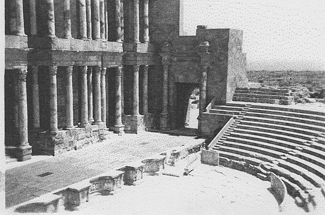 |
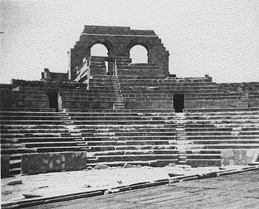 |
|
| 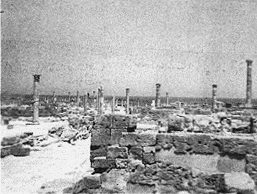 |
Not a bad posting!
